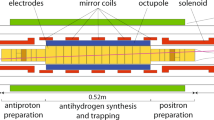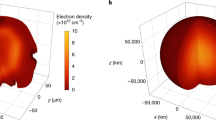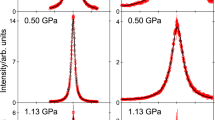Abstract
THE effects of ionizing radiations on gaseous methane have been examined previously and the yields of hydrogen and of higher hydrocarbons up to pentane determined to within what appear to be small limits of error1,2. Hydrogen is the major product, while the amounts of gaseous hydrocarbons are much less and decrease rapidly with increase in molecular weight. However, there is a 10–30 per cent excess of elemental hydrogen in the products1–3. In fact, a large excess of hydrogen seems to be a common feature of the radiation chemistry of gaseous hydrocarbons, though not of liquids4–6. It has been known for some time that massive radiation doses lead to the production of liquid products from low-molecular-weight saturated hydrocarbons7–9, while more recently a more detailed study of liquid product formation from methane and other gaseous hydrocarbons has been reported10,11. The nature of the liquid products and their significance in the overall radiolytic process have not been examined.
This is a preview of subscription content, access via your institution
Access options
Subscribe to this journal
Receive 51 print issues and online access
$199.00 per year
only $3.90 per issue
Buy this article
- Purchase on Springer Link
- Instant access to full article PDF
Prices may be subject to local taxes which are calculated during checkout
Similar content being viewed by others
References
Lampe, F. W., J. Amer. Chem. Soc., 79, 1055 (1957).
Yang, K., and Manno, P. J., J. Amer. Chem. Soc., 81, 3507 (1959).
Mains, G. J., and Newton, A. S., J. Phys. Chem., 65, 212 (1961).
Hardwick, T. J., J. Phys. Chem., 64, 1623 (1960).
de Vries, A. E., and Allen, A. O., J. Phys. Chem., 63, 879 (1959).
Freeman, G. R., J. Chem. Phys., 33, 71 (1960).
Lind, S. C., and Bardwell, D. C., Science, 62, 422 (1925).
Lind, S. C., and Bardwell, D. C., J. Amer. Chem. Soc., 48, 2335 (1926).
Honig, R. E., and Sheppard, C. W., J. Phys. Chem., 50, 119 (1946).
Mikhailov, B. M., Tarasova, L. V., and Bogdanov, V. S., Izd. Akad. Nauk S.S.S.R., 218 (1958).
Bogdanov, V. S., Russ. J. Phys. Chem., 34 (5), 496 (1960); Doklady A.N., S.S.S.R., 136, (1), 121 (1961).
Schissler, D. O., and Stevenson, D. P., J. Chem. Phys., 24, 926 (1956).
Meisels, G. G., Hamill, W. H., and Williams, R. R., J. Phys. Chem., 61, 1456 (1957).
Melton, C. E., J. Chem. Phys., 33, 647 (1960).
Rudolph, P. S., and Melton, C. E., J. Phys. Chem., 63, 916 (1959).
Field, F. H., J. Amer. Chem. Soc., 83, 1523 (1961).
Author information
Authors and Affiliations
Rights and permissions
About this article
Cite this article
HUMMEL, R. Production of High Molecular Weight Products from the Irradiation of Methane with 4-MeV. Electrons. Nature 192, 1178–1179 (1961). https://doi.org/10.1038/1921178a0
Issue Date:
DOI: https://doi.org/10.1038/1921178a0
Comments
By submitting a comment you agree to abide by our Terms and Community Guidelines. If you find something abusive or that does not comply with our terms or guidelines please flag it as inappropriate.



